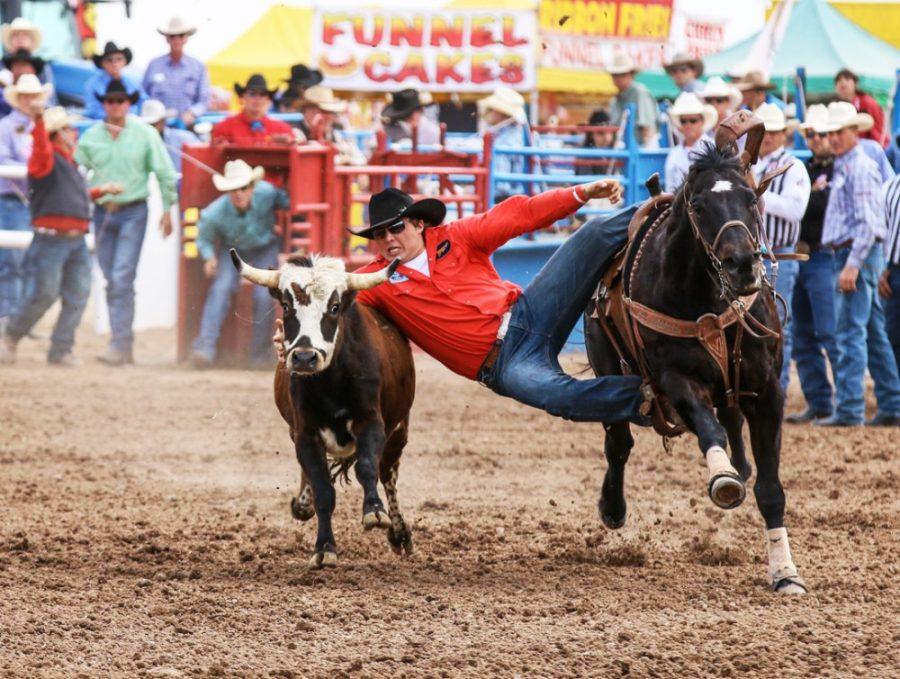In 1925, the city of Tucson held the first annual Tucson Rodeo, also known as La Fiesta de los Vaqueros. This year, the rodeo will be celebrating its 90-year anniversary.
According to the official website of the Tucson Rodeo, “Leighton Kramer conceived the idea of La Fiesta de los Vaqueros to draw visitors to Tucson during the mid-winter season.” In doing so, Tucson’s “wild-west notoriety” spread, and people learned about the work of cowboys. In that same year, the Rodeo Dance and the Rodeo Parade were also created. “The first Tucson Rodeo was held at Kramer Field,” the official website says, “now a neighborhood called Catalina Vista, east of Campbell Boulevard between Grant and Elm streets.”
Originally, the rodeo consisted of four events: steer wrestling, steer tying, calf roping and saddle bronc riding. Now, there are currently seven events at the Tucson Rodeo: bareback riding, steer wrestling, saddle bronc riding, tie-down roping, team roping, bull riding and women’s barrel racing.
Not only has the lineup of events changed over the years, but the reputation of the rodeo has also spread across the country. The Tucson Rodeo has become one of the top-25 professional rodeo events in North America and was inducted into the ProRodeo Hall of Fame in August 2008. In the first year of the rodeo, the prize money was about $6,650 for the winners; now, the prize money exceeds $320,000.
The Tucson Rodeo is an enormous part of the culture in the city of Tucson, as elementary students usually get a few days off of school for Rodeo Week. Gary Williams, general manager of the Tucson Rodeo, has been involved in the rodeo since his youth. He started attending the rodeo with his father and made several connections with some of the cowboys who participated in the event.
“I decided that’s what I wanted to be,” Williams said. “Specifically, I wanted to ride bulls. I started riding as a kid, rodeoed through college and then rode professionally for 16 years.”
After Williams stopped riding bulls, he became a clown/bullfighter for five years,, and then finally was able to take part in the administrative side of the rodeo when he joined the Tucson Rodeo Committee in 1987.
Williams said he believes that the Tucson Rodeo has become a vital part of Tucson’s culture.
“The Tucson Rodeo captures Tucson’s Western heritage unlike anything else at a time when we have lost a lot of that heritage in our community and elsewhere,” Williams said.
The rodeo has always been important to the city, as the first day of the rodeo — Feb. 21 — was deemed a school holiday after 1925, even though the UA stopped recognizing the holiday in the 1980s.
“Today [the rodeo] brings in over 200,000 visitors, so it is a boon for Tucson’s tourist industry, not to mention lots of fun,” said Julia Arriola, museum curator at the Arizona Historical Society.
The rodeo is a tradition here in Tucson, and the rodeo affects not only the cowboys competing, but also every citizen who attends or receives the day off due to the festivities.
“La Fiesta de los Vaqueros takes us back to the romantic West,” Arriola said. “And it brings us together, even if we just wear western attire for a few days.”
The rodeo is close to the hearts of many Tucsonans, as it has played an enormous part in their lives.
“[The rodeo] taught me self-reliance, discipline and how to overcome obstacles and how to deal with adversity,” Williams said. “Most of my best friends I know because of rodeo. It’s a tough way of life but a wonderful way of life. I couldn’t imagine my life without rodeo.”
This year, the rodeo begins on Saturday and runs through Mar. 1. Before the rodeo events of the day begin, the annual rodeo parade will take place on Thursday at 9 a.m. Tickets can be purchased online through the official Tucson Rodeo website, by phone or in person at the Tucson Rodeo Grounds.
_______________
Follow Chelsea Cook on Twitter.









